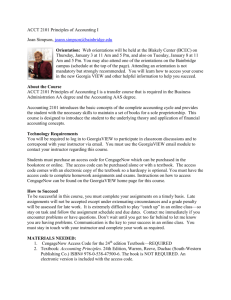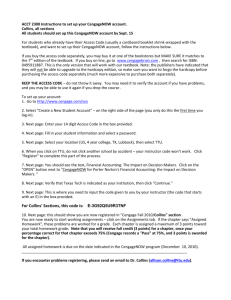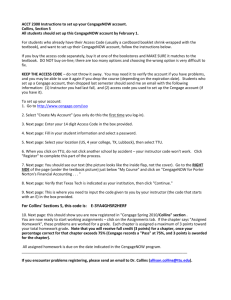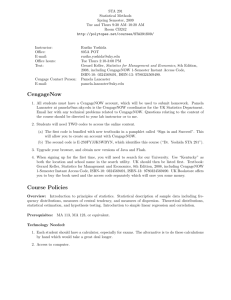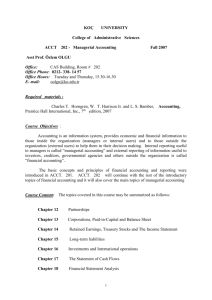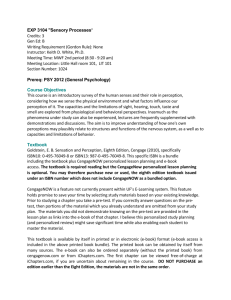Intro2007
advertisement
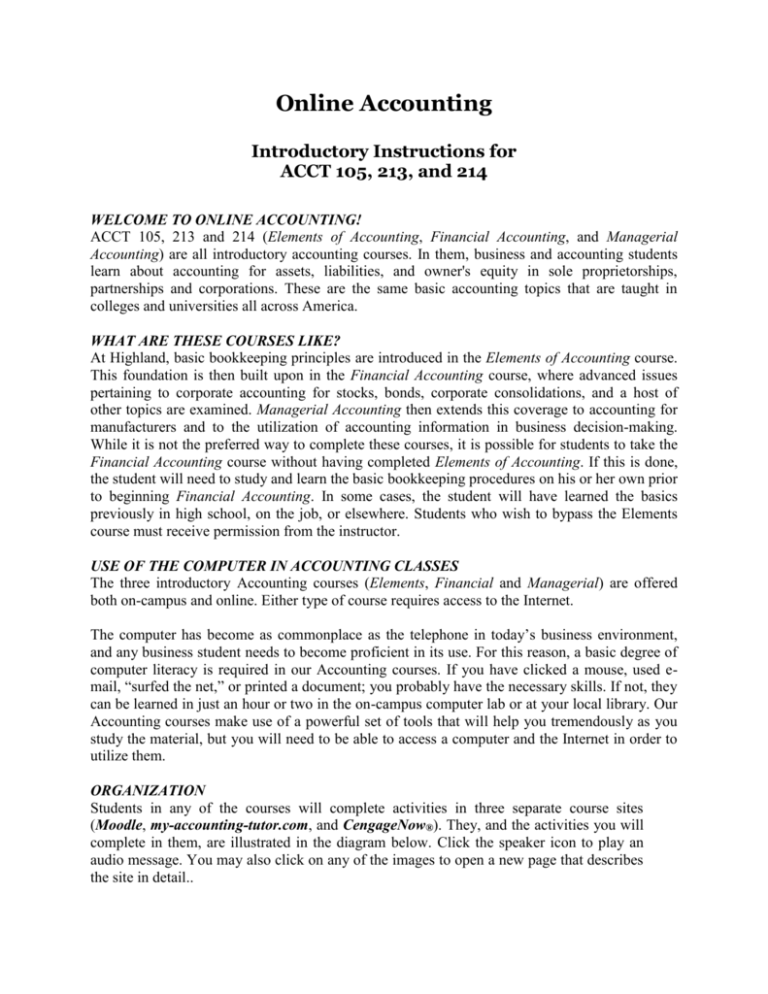
Online Accounting Introductory Instructions for ACCT 105, 213, and 214 WELCOME TO ONLINE ACCOUNTING! ACCT 105, 213 and 214 (Elements of Accounting, Financial Accounting, and Managerial Accounting) are all introductory accounting courses. In them, business and accounting students learn about accounting for assets, liabilities, and owner's equity in sole proprietorships, partnerships and corporations. These are the same basic accounting topics that are taught in colleges and universities all across America. WHAT ARE THESE COURSES LIKE? At Highland, basic bookkeeping principles are introduced in the Elements of Accounting course. This foundation is then built upon in the Financial Accounting course, where advanced issues pertaining to corporate accounting for stocks, bonds, corporate consolidations, and a host of other topics are examined. Managerial Accounting then extends this coverage to accounting for manufacturers and to the utilization of accounting information in business decision-making. While it is not the preferred way to complete these courses, it is possible for students to take the Financial Accounting course without having completed Elements of Accounting. If this is done, the student will need to study and learn the basic bookkeeping procedures on his or her own prior to beginning Financial Accounting. In some cases, the student will have learned the basics previously in high school, on the job, or elsewhere. Students who wish to bypass the Elements course must receive permission from the instructor. USE OF THE COMPUTER IN ACCOUNTING CLASSES The three introductory Accounting courses (Elements, Financial and Managerial) are offered both on-campus and online. Either type of course requires access to the Internet. The computer has become as commonplace as the telephone in today’s business environment, and any business student needs to become proficient in its use. For this reason, a basic degree of computer literacy is required in our Accounting courses. If you have clicked a mouse, used email, “surfed the net,” or printed a document; you probably have the necessary skills. If not, they can be learned in just an hour or two in the on-campus computer lab or at your local library. Our Accounting courses make use of a powerful set of tools that will help you tremendously as you study the material, but you will need to be able to access a computer and the Internet in order to utilize them. ORGANIZATION Students in any of the courses will complete activities in three separate course sites (Moodle, my-accounting-tutor.com, and CengageNow®). They, and the activities you will complete in them, are illustrated in the diagram below. Click the speaker icon to play an audio message. You may also click on any of the images to open a new page that describes the site in detail.. Introduction to the Course 2 ACCT 105, 213 and 214 Course Map Click any Item to Learn More my-accountingtutor.com Click to play (Your Instructor’s Site) http://my-accounting-tutor.com ASSIGNMENTS and READINGS Moodle CengageNow® (General College Course Site) http://moodle.highland.edu (Textbook Resource Site) http://academic.cengage.com/login CHAT, DISCUSS, ASK HOMEWORK and EXAMS As you complete your course you will be working in three different course sites. Click any of the course sites to learn more about them. You will find a detailed course map on the following page. You may also click below to launch a video presentation that shows you how to navigate among these resources and demonstrates the activities you will be completing in each of them. If you have not already done so, you should now view the “Beginning Your Accounting Course” audio/video presentation, which discusses the way the course is to be completed. Note: If you are in the ACCT 115, 116, 120 or 220 courses, the references to “CengageNow” in the video do not apply to you. Access this presentation by clicking the link below. Link to “Beginning Your Accounting Course” Presentation Introduction to the Course 3 ACCT 105, 213 and 214 Course Areas and Contents “Moodle” (General College Course Site) http://moodle.highland.edu my-accountingtutor.com (Your Instructor’s Site) http://my-accounting-tutor.com CengageNow® (formerly ThomsonNow®) (Textbook Resource Site) http://academic.cengage.com/login HCC Username and Password required for entry. No password required for entry. CengageNow® access card code required for entry. Contains: Contains: Contains: Solutions Manual (for suggested practice exercise and problems) Progress Reports (must be posted weekly) Online Learning Resources Course Manual (composed of several modules. Each module lists the assigned activities from ThomsonNow, along with a “written lecture,” video presentations, and example problems with solutions) Step 2 Weekly (recorded lectures, problem demo’s, video cases, games) Assigned Homework Problems and suggested practice problem solutions Step 1 Always begin with the Course Manual. Start with Module 1 and see what is assigned to be done in the textbook and in CengageNow. Read the remainder of the module, then go to CengageNow and complete the assigned activities. When you are finished, go on to Module 2 and repeat these steps. Don’t forget to post your progress reports weekly! Scored Exams and Practice Exams Gradebook The remainder of this document provides you with a list of required materials and an overview of the way the course operates. You will find information here about homework, examinations, the grading system, and our Accounting program. Introduction to the Course 4 MATERIALS To complete the Accounting 105, 213 or 214 courses, you should have the following materials: Either the required text (Financial and Managerial Accounting, by Warren, Reeves and Fess, South-Western Publishing Company) with a CengageNow access card; or a single CengageNow access card that you can use to access the textbook online (see the box below for more about purchase options). The Elements of Accounting (ACCT 105) course coverage includes chapters 1 through 6 and chapter 8 of the financial accounting portion of the text, and Financial Accounting (ACCT 213) covers chapters 7 and 9 through 15. Students in Managerial Accounting (ACCT 214) complete chapters 1 through 13 in the managerial accounting portion (the second half) of the book. A calculator to increase your speed and accuracy on homework and exams. Internet access. Microsoft Internet Explorer 6.0 or higher is recommended. The Course Manual, by Craig Pence. The manual is available free in the online course site to students registered in the course. The Course Manual will be your primary guide through the course you are taking. The manual organizes the course content into several learning modules. Each module begins with textbook and CengageNow assignments, and provides you with a written “lecture outline” over the module content, along with supplementary illustrations and information. Textbook Options One single textbook is used for the Elements of Accounting (ACCT 105), Financial Accounting (ACCT 213) and Managerial Accounting (ACCT 214) courses. It has been custom-published in order to reduce the cost to the student as much as possible. To make sure that you are getting the correct book, you should purchase it through the Highland Community College bookstore (815-599-3449 or 599-3459). This version of the book has no color (it is done in black-and-white print), and it is published on lower quality paper stock. The book comes bundled with 2 CengageNow (formerly ThomsonNow) access cards. One of the cards is used with Elements of Accounting/Financial Accounting; the other is used in Managerial Accounting. You may avoid the cost of the textbook bundle by purchasing only the CengageNow access card for your course. CengageNow provides students with an online “e-book” version of the textbook. You are able to logon to CengageNow and read the book online. You may also print out individual pages, sections or chapters and produce your own “hard copy” of the book if it is needed. Therefore, you have two options regarding the textbook (see below). Introduction to the Course 5 Textbook Options, Continued 1. Students may purchase the custom-published textbook, bundled with the Financial Accounting and Managerial Accounting access cards for CengageNow, from the HCC bookstore. This gives the student everything that will be needed for all three courses, ACCT 105, 213 and 214. (Who should do this? –Students who will take all three courses while at Highland, or students who want the convenience of having a printed textbook to work from while taking the course). Cost: $120 for printed textbook and 2 access cards. 2. Purchase only the CengageNow access card for the course that is being taken. You may buy the access card from the HCC bookstore or directly from Cengage Publishing Company on the CengageNow website. Be sure to get the access card for the Warren/Reeve Financial Accounting 10th edition textbook, or the Managerial Accounting 9th edition textbook, depending on the course you are taking. Refer to the instructions in the note below. The card code will give you access to the e-book for a period of 180 days. You will have to read the text online, or print the chapters out if you need a hard copy to refer to. (Who should do this? –Students who will take only one of the Accounting courses while at Highland, or students wish to save some money and believe they will be able to work with the online e-book successfully.). Cost: $60 at the bookstore for one access card, or $49.50 online (see below). NOTE: When you navigate to the registration page for CengageNow at http://academic.cengage.com/login you will see a "buy now" button that can be used to purchase the access code directly from Cengage. When you click the button, you are taken to the "I-Chapters" book order site. The order page is very confusing, and unless you know the code card ISBN number, it is very likely that you will not get the one. Search by ISBN, using the following ISBN numbers, and all should go well. At the time of this writing, the cards are sold through Cengage for $59.50 each. Card code ISBN for Elements and Financial Accounting: 0324539541 Card code ISBN for Managerial Accounting: 032464616X HOW TO COMPLETE THE COURSE (for students in the online sections only) 1. Always begin with the Course Manual. You access the manual by going to the myaccounting-tutor.com course site. Click on the link to your course (from the top of the page), and then open the Online Course Manual. Each module in the Online Course Manual may be viewed online, saved to disk, or printed (each is composed of 10 to 20 printed pages of text) by students enrolled in a course taught by the author. Introduction to the Course 6 The modules begin with an assignments table. The assignments table lists the following: The assigned readings from the textbook. The relevant CengageNow® “Study Tools” learning activities that students may access to review and reinforce their learning. These activities are composed of online lectures, problem solutions, and videos. They are assigned, and you may be tested over the material that is covered in them. The optional video-taped lessons that students may view at the Highland Community College Clarence Mitchell Library (http://highland.edu/library.asp) or at participating district libraries. Participating district libraries are located in Lena, Stockton, Elizabeth, Galena, East Dubuque, Hanover, Savanna, Mount Morris and Lanark. These video tape lectures are optional resource materials that students may find helpful, but they are not required. A list of optional practice exercises and problems from the textbook for students to complete, either on paper or online using CengageNow®. CengageNow® contains an online homework tool that allows students to work the exercises and problems from the textbook online. When you work the practice problems online and “submit” them for scoring, your results are shown along with the correct answers. These scores are not counted when determining your grade in the course; they are merely for practice. A list of assigned exercises and problems from the textbook for students in the online section of the course to complete using CengageNow®. (On-campus students will receive their assignments from their instructors.) These problems are scored and count toward the grade earned in the course. CengageNow® provides hints as students complete the assigned exercises and problems online, but the correct answers are never displayed. Students may continue to work on the problem and submit answers as many times as they like. When doing homework problems for credit, the student should continue working with the problem until a score of 100% is earned. Following the table is the written lecture. Here you will find an outline of the material presented in the textbook readings, along with supplementary information and illustrations and, sometimes, links to audio/video presentations of the material recorded by your instructor. You should begin by scanning this summary to grasp the general theme of the covered material. 2. After reviewing the Module's content, you should read the assigned pages of the textbook and then complete the assigned learning activities in CengageNow®. You may also want to view the optional video-taped lectures at your local library. Read the text carefully, and try to understand the material before completing the CengageNow® activities or viewing videos. Online courses, as opposed to “on-ground” ones, offer one great advantage. After all, living lecturers do not come equipped with a “back” button. Don't be afraid to replay a presentation several times if you have trouble understanding something. Introduction to the Course 7 About CengageNow® CengageNow® is the most “protected” of our three course sites, and it is the most powerful. Unfortunately, that means it is complicated and a little challenging to set up and begin using. But don’t worry. Help is available! When your instructor tells you that it is time to begin using Cengage in your course, you will need to play the three video presentations below. They will save you from a lot of confusion and frustration. (Just click the links to launch the videos.) Registering your Access Code in Cengage http://my-accounting-tutor.com/CengageRegistration/CNowRegistration.htm Using the Cengage Study Tools http://my-accounting-tutor.com/CengageStudyTools/CNowStudyTools.htm Doing Homework Assignments in Cengage http://my-accounting-tutor.com/CengageHomework/CNowHomework.htm Slides from the registration video can be opened by clicking HERE. You may want to print them out, or display them in another window on your computer while you go through the registration process. After you register, be sure to play the other two videos before you begin using Cengage in your course. Other Information In order to use Cengage, you will need to have a registration card (see above for purchase information). If you purchased the textbook from our bookstore, you received two of these cards with it – one for Financial Accounting and one for Managerial Accounting. Use the Financial Accounting code if you are taking Elements of Accounting or Financial Accounting. Enter the Managerial code if you are taking Managerial Accounting. After you go to the Cengage site and register, you will be asked for a “course key.” This is another code you must enter. It puts you into our course and into our gradebook. The course keys are listed below: Elements of Accounting 105 E-24UUDX7KNNURV Financial Accounting 213 E-YJUGUS782EED9 Managerial Accounting 214 E-YK8X5VSXMH6FQ The good news? After you enter the codes once, you won’t have to again! 3. Return to the Course Manual and the module outline. This time, carefully study the outline to review and reinforce your understanding of the topics presented. When you believe you have a firm understanding of the material, go on to step 4. 4. Complete as many of the learning resources on CengageNow® and as many of the module's suggested review exercises and problems as you believe are necessary in order to master the content. If you use CengageNow® to work these problems and exercises, you will be shown the correct answers when you submit your work for scoring. You may Introduction to the Course 8 also work the practice problems on paper, and then compare you answers with the solutions that are posted on the Moodle course site. These review problems and exercises give you the opportunity to drill until you achieve your learning objective. Do not quit until you know you understand the procedures that were applied in completing the problem. 5. Complete the Homework Assignments You will be assigned a total of 20 homework problems in Elements of Accounting and 20 in Financial Accounting. Students complete 40 problems in the Managerial Accounting course. These problems come from the textbook, and they are to be done for course credit using CengageNow®. Each module’s assignments are listed at the beginning of the module, in the Assignments table. You will receive a score when you complete these assigned problems, which will be recorded automatically in the online gradebook and will be factored in when your final grade is determined (see Final Grades below). If you have errors in your problem, you will be able to continue working on it, and you may resubmit it up to 20 times. There should be no reason for you to not score 100% on the homework problems! At the end of each chapter of the text, you will find a set of Questions followed by Exercises and Problems. There are two sets of Problems, a set of “A” problems and a set of “B” problems. The assigned problems that are graded for homework credit will come from the “B” problem set. Since the “A” problems are very similar to the “B” problems, you may find it beneficial to work the equivalent problem from the “A” set before doing the assigned problem. For example, if problem B-5 is assigned, you will find that doing problem A-5 before you begin B-5 will be very helpful. The assigned problems must be done using CengageNow®. The program presents you with an online form which you use to complete the problem, and gives you hints when you need them. You may re-do a problem as many times as you like, so there should be no reason to score less than 100%. Do not underestimate the importance of doing homework assignments and practicing with the suggested review exercises. Accounting is learned through practice! 6. After completing step 5, determine whether you are ready to go on. If you are satisfied that you have mastered the material, go to the next module, repeating these steps. However, if there are things you do not understand, it is a mistake to continue further. Accounting is “progressive” - each new lesson builds on the previous one. EXAMINATIONS The following applies to online students only. Two non-cumulative, closed-book examinations are required in the Elements of Accounting and two are required in Financial Accounting. Four exams are taken in Managerial Accounting. Examinations are taken via computer through CengageNow, and scores are reported immediately upon completion of the exam. There are numerous self-scoring practice exams available in the CengageNow course site to help students prepare for the scored exam. In addition, students who are dissatisfied with their scores on the first examination may take a second “repeat” examination over the same content. Only the highest score earned will be recorded. The exams are multiple-choice format and are both computational and conceptual. The exams are proctored, and they must be taken at the Highland Community College library in Freeport, Highland West in Elizabeth, an Illinois Virtual Campus site (see http://www.ivc.illinois.edu/institutions/providers.asp for a list of locations) or some other Introduction to the Course 9 location that has been arranged by the student and approved by the instructor. This could be a local library, another college, or at a location in another state or even outside the country. In the ACCT 105 course, examinations follow modules 3 and 7. In the ACCT 213 course, examinations follow modules 11 and 15. And in the ACCT 214 course, exams follow modules 3, 6, 9 and 13. Each examination in Elements and Financial Accounting is composed of 40 multiple choice questions. Each exam in Managerial Accounting is composed of 30 multiple choice questions. You are given 90 minutes to each exam, but they should only require one hour or less to complete. FINAL GRADES The following pertains to online students only. Final grades in the online courses are based upon homework scores and the two non-cumulative examinations as follows: ACCT 105/213 First Examination Second Examination Total Examination Points Assigned Homework Points Total ACCT 214 First Examination Second Examination Third Examination Fourth Examination Total Examination Points Assigned Homework Points Total Maximum Points 40 40 80 40 120 Maximum Points 30 30 30 30 120 60 180 Final letter grades in the courses will be assigned according to the total points earned on homework and exams in the course: Final Grade Scale Elements/Financial Managerial From To Grade From To Grade 108 120 A 162 180 A 96 107 B 144 161 B 84 95 C 126 143 C 72 83 D 108 125 D 0 71 U 0 107 U Introduction to the Course 10 TIME LIMITATIONS AND PROGRESS REPORTS Your work in the online course is self-scheduled, so there are no due dates for the completion of homework or examinations. However, there is a final cut-off date for completion of the course. If you are unable to finish your coursework in the same semester you enrolled in the course, and if you have been making acceptable progress in the course, you may request a time extension. Time extensions, if granted, cannot extend past midterm of the following semester (or the end of the summer semester, if you are enrolled in the spring semester). There is just one scheduled activity that students must complete in the course, a weekly “progress report.” This brief update is due each Sunday, and it provides a way for students to communicate with the instructor, and for the instructor to monitor the students’ progress. The progress reports are not graded, but they are required. Failure to post three consecutive progress reports will be viewed as evidence of non-participation and will result in the student’s withdrawal from the course. An audio/visual presentation is available that describes the process of posting your progress reports. You may access this presentation by clicking the link below: Link to “Progress Reports” Presentation HINTS AND SUGGESTIONS While a time extension may be granted to online students making acceptable progress in the course but not finished at the end of the semester, you should attempt to complete the course during the regular semester. Try to complete at least one lesson per week. Try to do a little every day, instead of attempting to crowd a week's work into a single day. Accounting tutors are available to help you on campus through Highland's Learning Resource Center (815-235-6121, extension 3446). You may schedule meetings with tutors on an appointment basis, and there is no charge for their services. ABOUT HIGHLAND’S ACCOUNTING COURSES The table below lists the Accounting courses that are available through Highland Community College. These courses are all transferable to other colleges and universities, though individual institutions have their own policies regarding acceptance of courses in transfer. For more information about transferring college course credit, contact the Highland Admissions Department at 815-235-6121 or through the following link: (http://highland.edu/admissions/transfer.asp). These courses all provide fundamental training in bookkeeping and accounting. All, with the exception of ACCT 211, Federal Income Tax, are available as online courses. (Note, though, that online students may take Federal Income Tax through the Illinois Virtual Campus network, or elsewhere, and transfer the course to Highland.) Online courses are taken independently, using a computer and the Internet, and no campus visits are required in order to take them. They are offered throughout the year, and students may start the online courses at any time they wish during the year. Introduction to the Course 11 Elements of Accounting ACCT-105 3 credit hours Prerequisite: None Federal Income Tax Accounting ACCT-211 3 credit hours Prerequisite: None Computer Applications ACCT 115 2 credit hours Prerequisite: ACCT 105 Introduction to Payroll ACCT-116 2 credit hours Prerequisite: None Introduction to QuickBooks ACCT-120 2 credit hours Prerequisite: None Advanced QuickBooks ACCT-220 2 credit hours Prerequisite: ACCT 120 and 105 Financial Accounting ACCT-213 4 credit hours Prerequisite: ACCT 105 Managerial Accounting ACCT-214 4 credit hours Prerequisite: ACCT 213 An audio/visual presentation is available that describes these courses and our programs in Accounting. It also addresses employment prospects and salary levels in the field. You may access this presentation by clicking the link below. Link to “Accounting Careers and Programs” Presentation The Elements of Accounting course is primarily concerned with the practical aspects of business bookkeeping. In this course, students learn the basic accounting procedures that are valuable in the workplace if the student is seeking an office job, and that are vital to success if the student wishes to operate his or her own small business. They are also needed in the Financial Accounting course and in other advanced Accounting courses that might be taken on 4-year campuses. The Computer Applications course introduces students to automated record-keeping systems in small businesses. In addition to examining issues related to financial and other records, this course provides students with a brief introduction to QuickBooks and basic payroll functions. This course, along with Elements of Accounting, are basic skills Accounting classes that will prepare you for success in the workplace and in advanced courses. Introduction to the Course 12 The Introduction to QuickBooks course introduces students to automated accounting using the QuickBooks general ledger accounting system. QuickBooks is a powerful accounting tool, but it is also designed to allow non-accountants to record many transactions by themselves (thus reducing their accounting expenses). This introductory course is aimed at the non-accountant, and does not require previous coursework in accounting. The Advanced QuickBooks course, though, presents more advanced features of the program and does require previous coursework in accounting or bookkeeping. Payroll Administration presents an overview of the state and federal laws that affect employment practices, withholdings, and to the filing of payroll tax forms and the payment of payroll taxes. Federal Income Tax Accounting is another occupational course that provides future bookkeepers and office managers with basic employment skills. It is also of interest to individuals who want to learn about preparing their own taxes. Financial Accounting and Managerial Accounting are the two courses that students must take in order to transfer as Juniors into Accounting and Business programs on 4-year campuses. Occupational students who complete the Associate of Applied Science degree in Accounting, or the Certificate in Accounting, are also required to take these courses. Financial Accounting presents advanced topics that "close the gap" between small-business bookkeeping and financial accounting and reporting for large corporations. Managerial Accounting is concerned with the use of accounting information in management decision-making, and to cost accounting procedures used by manufacturers. The course is appropriate for administrators in all types of organizations, persons working in manufacturing settings, or those planning to transfer to senior institutions. ABOUT HIGHLAND’S ACCOUNTING CERTIFICATES AND DEGREES The following Accounting certificates and degrees are available through Highland Community College: Accounts Clerk Certificate (18 credit hours, 8 courses) QuickBooks Professional Certificate (all courses available online, 20 credit hours, 10 courses) Accounting Certificate (27 credit hours, 11 courses) Associate of Applied Science (64 credit hours, 24 courses) The Value of a Certificate A certificate is similar to a degree, in that the student receives a document that looks like a diploma and it certifies the student’s learning. Students often wonder whether completing one or more of the certificate programs in accounting is “worth it.” There are four factors that you should consider if you are contemplating the completion of one or more of the accounting certificates: Introduction to the Course 13 (1) The courses you take that “count” in the certificate program also “count” toward the next certificate or degree you complete. In other words, you are able to pick up the certificates as you work your way through the Associate Degree program, without having to take any additional courses at all. (2) Each certificate that you complete adds an additional line to your resume and enhances your professional image. Even if you complete the Associate of Applied Science Degree, your resume will still be more impressive if it lists one or more certificates earned at HCC along with your degree. (3) Since they can be completed quickly, you will be adding lines to your resume that can help you land a job in the field as you work toward the next certificate or toward your Associate’s Degree. Experience in an office can really enhance your learning, and that experience also adds another valuable line to your resume. (4) Some students may find that one or more of our certificates are “enough” to reach their employment goals, and this can save them the time and money it would take to complete the associate’s degree. (It is always advisable, though, to complete as much education as you can, since more education usually results in higher income!) Completing a Certificate or Degree Online It is completely possible for students to complete certificate and degree programs at Highland by taking only online courses. However, except for the Accounts Clerk and QuickBooks Professional certificate programs in Accounting, there are a few required courses in the other accounting programs that are not available online through Highland. Online students should understand though, that by completing online courses offered through other institutions and transferring them to Highland, it is possible to complete many of Highland’s certificates and degrees. A listing of online courses that might be acceptable as substitutes may be viewed by visiting the Illinois Virtual Campus website at http://www.ivc.illinois.edu/. Before registering for any of these classes, it is imperative that students contact Highland advisors to ensure that the online course taken at the other institution will be accepted in transfer as equivalent to the course required in the Highland program. CAREER OPTIONS IN ACCOUNTING Accounting ranks among the top professional areas in terms of future job growth. While students wishing to become CPA’s or CMA’s must transfer to senior institutions and complete bachelors’ degrees in order to do so, bookkeepers are able to find rewarding jobs after completing a two-year degree, a certificate program, or just a few courses in accounting. Current salary levels for entry-level jobs in accounting and bookkeeping can be found in various publications or on the internet. One good source of career information is the United States Department of Labor’s “Occupational Outlook Handbook” (see http://www.bls.gov/oco/ocos001.htm, http://www.bls.gov/oco/ocos144.htm, and http://www.bls.gov/oco/ocos149.htm). Students in our programs should also consider becoming professionally certified in bookkeeping, QuickBooks, or in payroll. Two professional organizations, the American Institute of Professional Bookkeepers (http://www.aipb.org) and the American Payroll Association Introduction to the Course 14 (http://www.americanpayroll.org/), offer certification programs for bookkeepers that do not require completion of a college degree. Intuit, the publisher of QuickBooks, also certifies users of the QuickBooks program. Students who take our introductory accounting, payroll and QuickBooks courses will be prepared for the certification exams administered by these organizations, and they are encouraged to take advantage of them. A job applicant whose resume lists multiple certificates and/or degrees in Accounting, along with professional certifications, will surely be noticed! -END-
